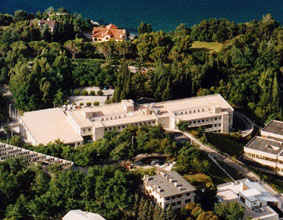Personal tools
News from ICTP 108 - Commentary

ICTP's and SISSA's long and fruitful relationship is now a quarter century young.
Two Anniversaries

This October, ICTP will be celebrating
its 40th anniversary. The Centre will not only be honouring its
singular contributions to global science but will also be highlightling
the role it has played in spawning a cluster of other institutions
in Trieste and the surrounding area--all of which share the Centre's
principles and goals.
One of the most significant of these institutions is the International
School for Advanced Studies (SISSA), which itself celebrated its
25th anniversary last November.
The neighbouring institutions, however, share more than anniversary
dates. The two, in fact, share a common heritage marked by years
of scientific cooperation and exchange that has been made possible
by the generosity of the Italian government.
The birth of ICTP in the mid 1960s took place against the backdrop
of a chronic international problem: the limited opportunities
for study that has plagued scientists from the developing world.
SISSA's creation in the late 1970s was a byproduct, in part, of
a devastating earthquake that rocked Friuli-Venezia-Giulia in
1976, prompting the Italian government to invest large sums of
money in the region as part of the rebuilding effort.
Paolo Budinich, Trieste's grand statesman for science, championed
the creation of both institutions. He worked closely with Abdus
Salam in the founding of ICTP, 'retiring' at the age of 60, only
to take up SISSA's mantle two years later.
Budinich envisioned that the two institutions would complement
one another and indeed he was right. Both would require vigorous
training and commitment. Both would emphasise scientific excellence.
Both would focus primarily on physics and mathematics. And both
would share faculty and classroom space to achieve their goals.
ICTP's short-term research and training--its conferences, schools
and workshops--provide a continual source of learning for graduate
students and professors, young and old, from around the world.
Four to six thousand scientists visit the Centre each year to
participate in these classroom 'sprints of knowledge.' SISSA,
meanwhile, is a three-to four-year PhD degree-granting programme--a
'long-distance intellectual run,' if you will--that enrols some
200 students each year, both from Italy and abroad.
ICTP's direct ties to the International Atomic Energy Agency (IAEA)
and the United Nations Educational, Scientific and Cultural Organization
(UNESCO) make it a full-fledged member of the UN family. SISSA,
meanwhile, is an Italian institution that bestows advanced degrees
sanctioned by the Italian government.
Shared goals for excellence in scientific research and training
have encouraged the two institutions to share their resources
as well--all for their common cause.
Many of SISSA's faculty members--including Stefano Fantoni, Michele
Parrinello, Dennis Sciama and myself, to name just a few--have
also worked for ICTP, lecturing at the Centre's workshops, tutoring
the Centre's Diploma Course students, and even serving as ICTP's
acting director, which I did between May 2002 and March 2003.
Until 1991, when our building was completed, SISSA's offices were
located in ICTP's Main Building along with the University of Trieste's
Department of Physics.
As the fields of physics and mathematics continue to expand and
the barriers between disciplines are stripped away, no one institution
can hope to meet the demands of the entire scientific community.
The 'principle of partnership' that SISSA and ICTP established
more than two decades ago and that we celebrate on the occasion
of our anniversaries does not simply provide an opportunity to
honour our past but also offers a valuable signpost for our shared
futures.
Erio Tosatti
Head, Condensed Matter Sector
SISSA
ICTP Acting Director, 2002-2003